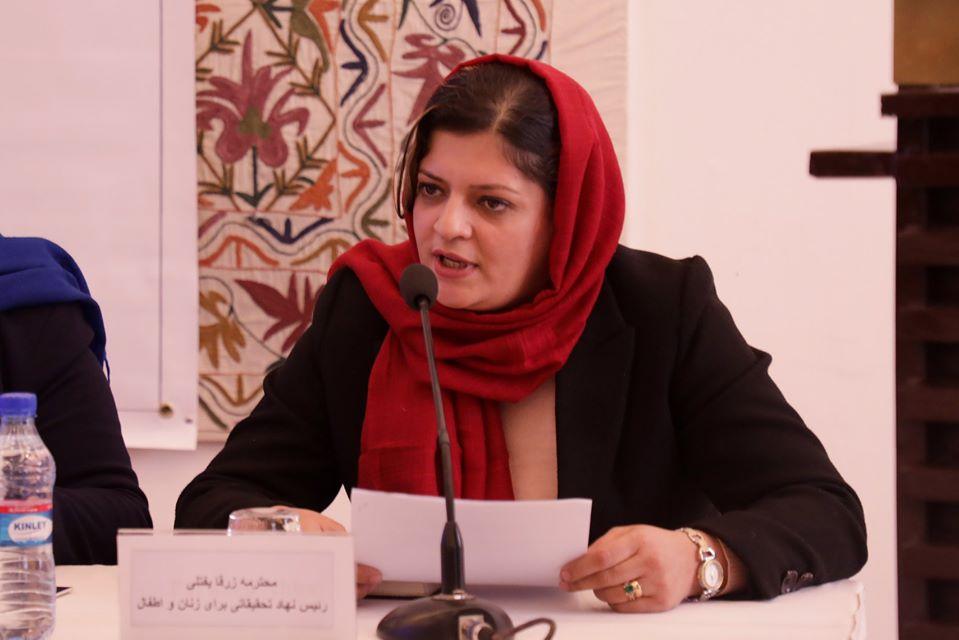20 Years Later: Full Implementation of the WPS Agenda Remains Critical
This month marks the 20th anniversary of UNSCR 1325, as well as the 20th birthday of our Women, Peace and Security Programme, PeaceWomen.
In this Women, Peace and Security Monitor, we include: our analysis of this year’s Open Debate on WPS; the civil society briefing delivered by Zarqa Yaftali; our coalition’s coverage of the negotiations around the proposed WPS resolution which was not adopted; and a recent webinar WILPF hosted with women from different regions reflecting on implementation of the agenda over the last 20 years.
WILPF Analysis: 2020 Security Council Open Debate on WPS
Zarqa Yaftali (3).jpg

On 29 October 2020, under the presidency of Russia, member states commemorated the 20th anniversary of the United Nations Security Council Resolution 1325 during an open debate on women, peace and security (WPS).
WILPF did a rapid analysis of the debate. In our analysis, we report on key themes, the briefings, and the roadblocks to implementation.
Security Council Members Unite to Protect the Women, Peace and Security Agenda on its 20th Anniversary
Russia, which holds the presidency of the UN Security Council in October 2020, presided over the annual open debate on women, peace and security (WPS) on 29 October 2020 as well as negotiations over a draft resolution (laid out in S/2020/1054) that failed to be adopted. The draft resolution put forth by Russia, on the pretext of commemorating the 20th anniversary of UN Security Council resolution 1325 (2000), the groundbreaking resolution that recognized the disproportionate impact of war on women and girls and their critical role in building peace, received 10 abstentions from a cross-regional group of Security Council members in a strong show of support for protection of the normative framework and progress achieved over 20 years, and refusal to accept any attempts towater down the agenda. Russia, China, South Africa, Vietnam and Indonesia voted in favor of the resolution. There were no votes against.
Civil Society Statement at the Open Debate on Women, Peace and Security
Zarqa Yaftali, Executive Director of the Women and Children Legal Research Foundation, briefed the Council representing the NGO Working Group on Women, Peace and Security, urging the UNSC and all member states to turn words into tangible action. She called on member states to put political pressure on the Taliban and Afghan government to ensure that women’s human rights and civil liberties are protected, with widespread and meaningful participation of women in the peace process.
Webinar on UNSCR 1325 at 20 Years: Perspectives from Feminist Peace Activists
On October 21, WILPF held a panel discussion on 20 years of WPS implementation from the perspective of grassroots peace activists. The panel featured WILPF members and partners from Australia, Colombia, Libya, and Sweden, who spoke about their experiences working on WPS in their own contexts, and identified some of the progress, gaps and opportunities for making meaningful change.
Inas Miloud of the Tamazight Women’s Movement brought up the need for more intersectionality in WPS discussions on women’s meaningful participation, including with regards to indigenous women. Gabriella Irsten and Ludmilla Kwitko both highlighted the gap between rhetoric and action, including by countries that are vocal supporters of gender equality but continue to export arms and increase spending on militaries. Diana Salcedo López talked about how ideas of militarism and machismo become ingrained in societies, and that it is important to even look beyond the most visible signs of militarization towards deeper norms. All panelists affirmed that demilitarization and disarmament are critical to WPS implementation, but frequently overlooked in favor of other issues.
WILPF International President, Joy Onyesoh, was originally planned to speak on the panel but instead took to the streets to support #EndSARS mobilizing in Nigeria. Please read this Twitter thread with some remarks from her about this movement and the current situation in Nigeria.
Further Readings
NGO Working Group on Women, Peace and Security: 2020 Open Letter to Permanent Representatives to the United Nations on the occasion of the 20th anniversary of Resolution 1325 (2000)
Zarqa Yaftali, 29 October 2020: Statement at the UN Security Council Open Debate on Women, Peace and Security
Dawlaty and Women’s International League for Peace and Freedom (WILPF): Policy brief: Sexual Violence by Force of Arms Against Women in Syria: A Tool of Political Repression, Social Dismantling and Impoverishment of Women and Communities.
WILPF WPS Programme, September 2020: Conflict, Ceasefire and Complicity: The Security Council on Yemen.
WILPF WPS Programme, July 2020: Arria Formula Meeting on Women and the Afghan Peace Process.
Women’s International League for Peace and Freedom: COVID-19 and Gender Justice: Feminists in MENA Defying Global Structural Failure.


WILPF's Women, Peace and Security programme promotes conflict prevention, and the full, equal, and meaningful participation of women in all efforts to create and maintain international peace and security.
For more about our work, go to our website, follow us on Twitter, and subscribe to WILPF's other newsletters!